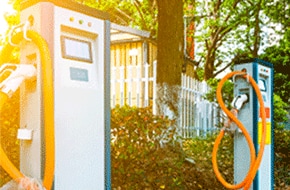Webinar - Designing DC fast charging stations for electric vehicles
 | Join us for our 1-hour webinar on the advantages of using a DC charging system over an on-board AC charger for electric vehicles (EV)Wednesday, September 11th 2019 | 3 PM CET
|
This 1-hour webinar discusses the advantages of using a DC charging system over an on-board AC charger for electric vehicles (EV).
Following an overview of typical power classes and their target applications, we will look at the main electrical concepts, compare the most common topologies and show how to implement these new technologies.
Finally, we will present a real-life DC charger design for EVs developed using the latest generation of SiC devices and isolated gate drivers.
Agenda
- Typical power classes of DC chargers
- Electrical concepts and commonly used topologies
- Recommended power devices according to target performance and costs
- Practical example 22kW charger design
Who should attend
- Hardware engineers designing battery chargers, especially for electrical vehicles
- Engineers looking to develop efficient 3-phase power supplies
- E-mobility experts interested in learning about the infra-structure required for electrical vehicles
What you will take away
- Overview of CharIN initiative for Combined Charging System (CCS) standards
- Installation and ownership costs of EV charging systems
- In depth look at charger topologies and conversion stage
- ST's solutions for cost-effective designs
·
Registration information
This webinar will be broadcast twice, at convenient times for international audiences. Please review the times listed below and register for the most appropriate option for your time zone.
- September 11th, 2019 at 3:00 pm CET
- September 12th, 2019 at 2:00 pm EST
There is no charge to participate in this event, but you must register through my.st.com.
Speakers

With more than 15 years' experience in power electronics, Vladimir Scarpa is a Technical Marketing Manager for ST Power Devices (EMEA). His main interests are power devices and their applications in industrial systems, including renewable energies, battery chargers and uninterruptable power supplies (UPS).
